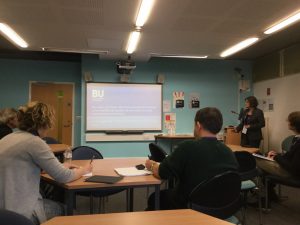In this year’s annual conference of the British Educational Research Association (BERA), the Centre for Excellence in Learning (CEL) at Bournemouth University had a significant presence. Dr. Sue Eccles presented a paper on the subject “Young People in Care: Aspirations and Experiences of Progressing to Further or Higher Education”. The number of care leavers progressing from secondary to tertiary education remains stubbornly low despite support they may receive from a variety of sources. In 2015, less than a quarter of 19 to 21 year-old care leavers were in further or higher education (HE). This study explored the perceptions and aspirations of young people in care considering progressing to further or higher education. In particular, we were keen to identify where they currently seek advice and guidance, the resources they access and some of the challenges they face in making an informed decision. The study included focus groups and interviews with the key stakeholders (young people in care, care leavers in HE, social workers, Virtual School teams, foster carers and other key workers). This provided a rich picture of young people’s ambitions, the breadth of advice and guidance available and the importance of personal relationships in supporting these young people. The findings suggest that young people seek advice from a range of sources. However, sometimes the guidance given is felt to be limited or incomplete. One overwhelming finding was the sense that ‘college or university is not for me’ – that it is not the ‘natural’ progression that it may be for their peers, that they do not have the social, financial or cultural capital required to continue into tertiary education. For those young people who do make this transition, it is clear that individ ual support provided by the institution will help overcome the ongoing personal, financial and academic challenges they may face.
ual support provided by the institution will help overcome the ongoing personal, financial and academic challenges they may face.
The study identified the support and commitment available to young people in care and also highlighted their increasing reliance on online resources. As well as using such technology for social purposes (e.g. Facebook, Twitter) they also use online sites to seek further information, clarify uncertainties and help in their decision-making. However, it is clear that the relationship they have with one or more of their key contacts is crucial in helping them develop the confidence and knowledge to progress to further or higher education. The study explored the impact of strong versus ‘spoiled’ relationships in their decision-making – role models provide inspiration and encouragement, whilst fragmented or weak relationships can decrease self-confidence, create uncertainties and reduce aspirations.
Dr Marcellus Mbah’s presentation – “Optimising Higher Education Opportunities through Financial Support: What More Do Students Need?” – highlighted that institutional financial support, such as maintenance bursaries, hardship funds and care leaver grants are intended to enable students who are from WP backgrounds and/or experiencing financial hardship to participate in higher education on a somewhat equal basis like their affluent peers. Whilst the aims of such support is to enhance access to HE, retention and academic success (which can be monitored using existing institutional data), less is understood about how these students perceive and experience financial support in providing them with greater opportunities overall. As Thomas (2015) noted, a range of other factors can play a significant part not only as key determinants of student enrolment and success in higher education but also in increasing the impact of financial support. The study was situated in a single UK university and, in order to explore both the breadth and depth of issues, a mixed methods approach was used – an online questionnaire, in-depth semi-structured interviews and focus groups. All current student beneficiaries of the university’s financial support were invited to complete the survey and 612 responded. This was followed by four semi-structured interviews and two focus group discussions with students in receipt of financial support.
The quantitative data provided a broad overview of students’ expectations and perceptions of receiving financial support. The analysis revealed more personal experiences of the impact of the university’s financial support schemes. The findings suggest that the university’s financial support to students is mostly perceived to have a positive impact in terms of supporting them in more fully engaging with their studies and the wider university experience. However, three areas where institutions could improve the administration of financial support emerged: pre-financial support to better ascertain the nature and level of bursary and any non-financial complementary support required by individual students; embedding financial mentoring to help students with budgeting and addressing any non-financial issues such as stress, academic performance and low confidence; and post-financial guidance to support students towards longer-term financial independence and stability. Whilst receiving financial support clearly helps these students, universities could do more to ensure that the opportunities created are sustainable for students in the longer term.
If you wish to find out more about these presentations, you can contact Dr Sue Eccles here or Dr Marcellus Mbah here!







